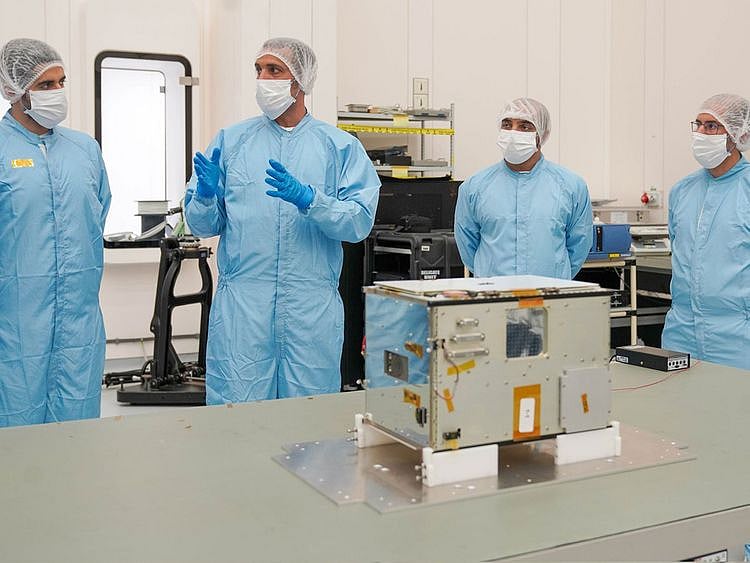Dubai: The UAE is set to write a new chapter in the history of space exploration by launching a new satellite that will help transport and deploy partners’ payloads on space missions.
The Mohammed Bin Rashid Space Centre (MBRSC) on Tuesday announced the scheduled launch date for the first mission of the Payload Hosting Initiative - PHI-Demo.
Earmarked for lift-off at 3:34pm UAE time on June 27, the programme’s maiden mission, PHI-Demo, is set to ascend the skies from Russia’s Vostochny Cosmodrome aboard the Soyuz-2 rocket.
This pioneering initiative, jointly led by MBRSC and the United Nations Office for Outer Space Affairs (UNOOSA), is at the forefront of global collaborations, providing space access and hastening the sustainable progression of novel space technologies. The programme’s design provides a cost-efficient and effective pathway for the first-time assessment of emerging space technologies in their true operational environment – in space.
Following rigorous environmental and flight review assessments, the state-of-the-art 12U modular satellite platform is primed for launch, carrying two partner technology payloads onboard.
1. IoT Communication Payload: The advanced IoT communication payload is engineered by OQ Technology, a UAE-based start-up under MBRSC’s Space Ventures initiative. It enables the storage and forwarding of data collected from IoT devices in remote areas, industries, and autonomous vehicles, utilising state-of-the-art 5G technology.
2. Green and Safe Propulsion Subsystem: The satellite platform incorporates a revolutionary green propulsion subsystem developed by SteamJet from the United Kingdom. This subsystem employs water as the primary propellant, ensuring a sustainable and environmentally friendly approach to space propulsion.
Once successfully launched, PHI-Demo will further contribute to the space technology landscape, boasting exceptional features and capabilities. Its innovative design and functionality make it the first of its kind in the region, positioning MBRSC as a frontrunner in the field of space exploration and satellite technology.
Commenting on the launch, Salem Humaid Al Marri, director-general, MBRSC, said: “MBRSC is boldly charting new frontiers as we broaden our missions and programmes. Our aspiration is to permeate various sectors in the UAE and beyond with cutting-edge space technology, accelerating the realisation of our nation’s visionary goals. The upcoming launch of PHI-Demo, our first endeavour under the Payload Hosting Initiative initiated last year, is a significant milestone on this journey. We are not just reaching for the stars; we are building bridges to them.”
In a tweet, Al Marri said: “This mission is an opportunity that we provide entities and stakeholders to send their innovations to space. This time, we are sending two technologies to be tested. Proud of the team that developed the satellite.”
“#PHI is a 100% Emirati developed satellite with all its mechanical components completed in the #UAE in collaboration with the private sector. This is the first mission of the Payload Hosting Initiative that we will be launching, & we are planning for more. Our goal is to ensure access for everyone to take part in the development and exploration journey,” he added in the tweet.
Zakaria Al Shamsi, project manager of Payload Hosting Initiative, MBRSC said: “PHI-Demo is an innovative initiative, the first-of-its-kind in the region, designed to escort our partner entities’ payloads to space while extending operational support. This mission not only serves as our trail for all forthcoming PHI missions but also holds significant value as a programme that will be beneficial for a lot of organisations and entities within the region. The programme and the PHI missions will empower our partners to actualise their space ambitions, thereby catalysing a push for an advanced tomorrow.”
Launch timeline
The anticipated launch of the Soyuz-2 rocket, carrying PHI-Demo, is slated to occur within the given window of 3:34 pm UAE Time. The first major milestone of the launch, the separation stage, will initiate a two-hour countdown for the dedicated team at the MBRSC ground station to establish the first signal from PHI-Demo. This critical first connection serves as a health check for the modular satellite, confirming its resilience after withstanding the intense turbulence of the launch.
24 hours post reaching its orbital position, which is at an altitude of about 550 km, PHI-Demo will mark another significant milestone, the establishment of the second communication with the satellite, operated from the labs of partner universities - American University RAK and Khalifa University. The successful inception of this communication will confirm the successful launch of the mission.
Communication with PHI-DEMO
Post successful launch, the next significant milestone lies in the deployment of the solar panel. This pivotal component provides essential power to the payloads. A meticulously planned five-day period has been allotted for this critical phase.
During this time, the MBRSC technical team will maintain daily, precise 10-minute communications as the PHI-Demo traverses above the UAE. These moments of connectivity allow MBRSC to execute operating commands that initiate and establish a robust line of communication with the payload.
Upon successful completion of the five days, the team will embark on payload operations, a collaborative endeavour between MBRSC, Khalifa University, and the American University of Ras Al Khaimah. Command operations will be expertly handled from the ground stations located within the university campus, with the university’s faculty members leading the operation.
This mission is key, as its results will profoundly shape the future PHI endeavours.
MBRSC is set to make history once again with PHI-Demo, setting the stage for a new era of space exploration and innovation. The launch of this ground-breaking satellite platform marks a significant milestone in MBRSC’s ongoing mission to push the boundaries of scientific discovery and technology advancement.
Sign up for the Daily Briefing
Get the latest news and updates straight to your inbox
Network Links
GN StoreDownload our app
© Al Nisr Publishing LLC 2026. All rights reserved.
